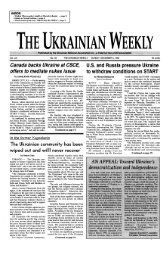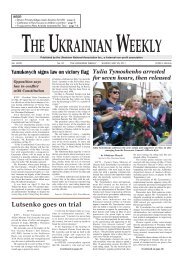In Canada, a discussion of vanishing Jewish heritage in Ukraine ...
In Canada, a discussion of vanishing Jewish heritage in Ukraine ...
In Canada, a discussion of vanishing Jewish heritage in Ukraine ...
Create successful ePaper yourself
Turn your PDF publications into a flip-book with our unique Google optimized e-Paper software.
8<br />
THE UKRAINIAN WEEKLY SUNDAY, MAY 2, 2010<br />
No. 18<br />
CUPP alumni gather <strong>in</strong> Wash<strong>in</strong>gton to shape a “Model Ukra<strong>in</strong>e”<br />
by Roman Tashlitskyy<br />
WASHINGTON – Alumni <strong>of</strong> the<br />
<strong>Canada</strong>-Ukra<strong>in</strong>e Parliamentary Program<br />
(CUPP) gathered <strong>in</strong> February for a twoday<br />
conference <strong>in</strong> Wash<strong>in</strong>gton at the<br />
Elliott School <strong>of</strong> <strong>In</strong>ternational Affairs <strong>of</strong><br />
George Wash<strong>in</strong>gton University.<br />
CUPP <strong>of</strong>fers students from Ukra<strong>in</strong>e an<br />
opportunity to serve as <strong>in</strong>terns <strong>in</strong> the<br />
Canadian House <strong>of</strong> Commons, where<br />
they can witness the work<strong>in</strong>gs <strong>of</strong> a real<br />
democracy first-hand. The recent conference<br />
gave CUPP alumni from different<br />
years, who are now pursu<strong>in</strong>g their education<br />
or careers <strong>in</strong> North America, a forum<br />
to share their ideas on the <strong>in</strong>dividual,<br />
identity, rights and responsibilities <strong>in</strong> a<br />
“Model Ukra<strong>in</strong>e,” the conference’s topic.<br />
The <strong>discussion</strong>s were heated due to the<br />
fact that the conference was held a few<br />
days after the presidential election <strong>in</strong><br />
Ukra<strong>in</strong>e, the outcome <strong>of</strong> which drastically<br />
changed the direction <strong>of</strong> Ukra<strong>in</strong>ian politics.<br />
Participants approached the topic<br />
from different perspectives and discussed<br />
the follow<strong>in</strong>g themes: Ukra<strong>in</strong>ian identity<br />
(Who is a Ukra<strong>in</strong>ian? Is it someone with<br />
a Ukra<strong>in</strong>ian passport, or is this someth<strong>in</strong>g<br />
ak<strong>in</strong> to the state <strong>of</strong> m<strong>in</strong>d, regardless <strong>of</strong><br />
citizenship?); how we can make our<br />
native language become a common value,<br />
rather than someth<strong>in</strong>g that divides<br />
Ukra<strong>in</strong>ians (Participants from eastern and<br />
southern Ukra<strong>in</strong>e suggested that a forced<br />
<strong>in</strong>troduction <strong>of</strong> Ukra<strong>in</strong>ian <strong>in</strong> all spheres <strong>of</strong><br />
life had a negative effect, and <strong>in</strong> order to<br />
make Ukra<strong>in</strong>ian acceptable among traditional<br />
Russian-speakers, the government<br />
could use positive market<strong>in</strong>g techniques);<br />
<strong>of</strong>ficial recognition <strong>of</strong> <strong>in</strong>dividuals <strong>in</strong><br />
Ukra<strong>in</strong>ian history, such as Shukhevych<br />
and Bandera (shall we ignore those who<br />
disagree with their status as heroes, or<br />
would it be more reasonable to devote<br />
more attention to education on these subjects?);<br />
and whether Ukra<strong>in</strong>e is a postcolonial<br />
state or should it share the<br />
responsibility for the tragedies <strong>in</strong> its history<br />
and refuse to see its history.<br />
Another <strong>in</strong>terest<strong>in</strong>g component <strong>of</strong> the<br />
conference was the participation <strong>of</strong> <strong>in</strong>vited<br />
honored guests. For example, Dr. Taras<br />
Kuzio, whom many <strong>in</strong> Ukra<strong>in</strong>e know<br />
through his blog <strong>in</strong> the <strong>in</strong>fluential<br />
Ukra<strong>in</strong>ian onl<strong>in</strong>e newspaper Ukray<strong>in</strong>ska<br />
Pravda, had a presentation on the subject<br />
“What does the election <strong>of</strong> Yanukovych<br />
mean for Ukra<strong>in</strong>e?”<br />
Though most <strong>of</strong> the CUPP alumni<br />
present were upset by Mr. Yanukovych’s<br />
victory, they didn’t automatically have<br />
praise for Yulia Tymoshenko, his ma<strong>in</strong><br />
competitor. That is why Dr. Kuzio, as a<br />
supporter <strong>of</strong> the former Ukra<strong>in</strong>ian prime<br />
m<strong>in</strong>ister, had to respond to some uncomfortable<br />
questions.<br />
Andy Semotiouk, an attorney from Los<br />
Angeles, gave an impressive lecture titled<br />
“If you don’t know where you came from,<br />
you cannot know where you are go<strong>in</strong>g.<br />
What can be learned from Ukra<strong>in</strong>ian history?<br />
What can be learned from the foreign<br />
experience?” His presentation was<br />
full <strong>of</strong> emotional and thought-provok<strong>in</strong>g<br />
moments, which will surely be impr<strong>in</strong>ted<br />
<strong>in</strong> the memory <strong>of</strong> the conference participants.<br />
For example, he expla<strong>in</strong>ed how, while<br />
visit<strong>in</strong>g Ukra<strong>in</strong>e dur<strong>in</strong>g the Soviet era, his<br />
relatives had to take him to an open country<br />
field – and even there they felt the<br />
need to whisper <strong>in</strong> his ear – <strong>in</strong> order to<br />
speak about their relatives who belonged<br />
to the Ukra<strong>in</strong>ian <strong>In</strong>surgent Army (UPA).<br />
The conference attendees alumni from the <strong>Canada</strong>-Ukra<strong>in</strong>e Parliamentary<br />
Program <strong>of</strong> various years who are now study<strong>in</strong>g or work<strong>in</strong>g <strong>in</strong> North America.<br />
Bohdan Vitvitsky – about whom most<br />
<strong>of</strong> the CUPPers knew because they wrote<br />
assignments based on his essay about the<br />
Ukra<strong>in</strong>ian language <strong>in</strong> order to get <strong>in</strong>to<br />
the program – spoke on “Patriotism, facts,<br />
history, learn<strong>in</strong>g from others, and who vs.<br />
what.” He was somewhat critical <strong>of</strong> the<br />
current Ukra<strong>in</strong>ian society, say<strong>in</strong>g<br />
Ukra<strong>in</strong>ians sometimes do th<strong>in</strong>gs that can’t<br />
be expla<strong>in</strong>ed from a rational viewpo<strong>in</strong>t.<br />
Hav<strong>in</strong>g worked for two years at the U.S.<br />
Embassy <strong>in</strong> Kyiv on an anti-corruption<br />
project, he was very conv<strong>in</strong>c<strong>in</strong>g.<br />
<strong>In</strong> the course <strong>of</strong> his presentation, he<br />
<strong>in</strong>serted a short quiz, try<strong>in</strong>g to catch the<br />
alumni <strong>in</strong> their ignorance <strong>of</strong> some important<br />
facts from Ukra<strong>in</strong>ian history.<br />
Fortunately, the CUPPers are not average<br />
Ukra<strong>in</strong>ian students, so they were quick to<br />
answer. However, Dr. Vitvitsky did suggest<br />
read<strong>in</strong>g more books.<br />
The conference was also a good opportunity<br />
for those <strong>in</strong>terested <strong>in</strong> Ukra<strong>in</strong>e to<br />
communicate with young Ukra<strong>in</strong>ians. <strong>In</strong><br />
fact, the conference venue was full <strong>of</strong><br />
such people.<br />
One <strong>of</strong> the speakers expressed the idea<br />
that each democratic society must have<br />
three constituents: a strong opposition, a<br />
free mass media and a developed civil<br />
society. Ukra<strong>in</strong>e seems to have the first<br />
two. The third one – the most difficult to<br />
achieve and the most important, is still <strong>in</strong><br />
a nascent state.<br />
<strong>In</strong> his clos<strong>in</strong>g remarks, Ihor Bardyn,<br />
CUPP director, expressed hope that the<br />
conference <strong>of</strong> these current and future<br />
leaders <strong>of</strong> Ukra<strong>in</strong>e, who <strong>in</strong>fluence their<br />
respective fields and environment, would<br />
be a small but considerable step <strong>in</strong> build<strong>in</strong>g<br />
civil society <strong>in</strong> Ukra<strong>in</strong>e. S<strong>in</strong>ce the<br />
Wash<strong>in</strong>gton conference was the first <strong>in</strong> a<br />
series <strong>of</strong> CUPP conferences, the participants<br />
suggested recommendations for<br />
subsequent conferences.<br />
The second conference will take place<br />
<strong>in</strong> Ottawa, Ontario, <strong>in</strong> October <strong>of</strong> this<br />
year and will focus on the state, its electoral<br />
system, its <strong>in</strong>tegration <strong>in</strong>to the Euro-<br />
Atlantic community and its relations with<br />
the European Union, Russia and the<br />
United States. The third conference is<br />
scheduled to take place <strong>in</strong> Kyiv <strong>in</strong><br />
November 2011 and will focus on comb<strong>in</strong><strong>in</strong>g<br />
the deliberations <strong>of</strong> the first two<br />
conferences to create a model.<br />
Taras Kuzio, a supporter <strong>of</strong> Prime M<strong>in</strong>ister Yulia Tymoshenko, fields some<br />
uncomfortable questions from conference participants.

















